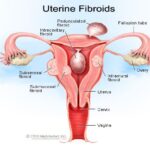Cases of Fibroid are rising in the country, experts at the Korle Bu Teaching Hospital said on Monday.
Statistics at the hospital indicate that out of 726 major elective gynecology operations carried out in 1998, fibroid cases accounted for 384 which is more than 50 per cent of the operations.
In an interview in Accra, Dr. Kobina Nkyerkyer, a gynecologist with the hospital said though these figures are alarming, the number of cases may not represent the actual number of persons having the disease.
” This is because most women who have the disease do not even know and therefore do not report for treatment”.
Fibroid, a tumour of the muscle fibres of the womb, is caused by the female hormones and affects women who are usually above 20 years.
“Research has so far not been able to identify the actual cause of the disease.
“Fibroid is very difficult to identify at an early stage unless one goes through series of tests and examinations before it is diagnosed,” he said.
Symptoms include excessive bleeding, anaemia, frequent passage of urine and delay in pregnancy.
Dr. Nkyerkyer refuted claims that fibroid is the cause of barrenness among women especially those who have no children after 30 years, and said though fibroid may cause delay in child bearing if not removed, it is totally not the cause of barrenness.
He explained, however, that most women get the disease after having their first or second child.
Dr Nkyerkyer said the chances of a fibroid patient having or not having children depends on the size of the tumour and where exactly in the womb it grows.
He said fibroid can be treated in diverse ways such a monitoring and
assessing the tumour at the early stage when it is small and giving the patient no problems until a time that it can be removed.
Secondly, it can also be treated through Myomectomy. This is where the fibroid is removed leaving the womb intact for the woman to be able to give birth again, but in this case, there is a 15 per cent chance of the tumour growing again.
The next treatment requires the removal of the fibroid and the womb together and this is known as Hysterectomy.
In such cases, according to the gynecologist, the tumour is so huge that it has destroyed the womb making it impossible for the woman to bear children again.
“This is mostly found in women who do not report to the hospital early”, Dr Nkyerkyer said.
“The last is by putting the patient on medication, where, she will be given drugs to reduce the size of the tumour by 50 per cent for about three months but once more the tumour is likely to grow again”.
He noted that the drugs used for this type of treatment, is very expensive and it is mostly practised in the developed countries.
Dr Nkyerkyer said it is regrettable that “some people relate this disease to spiritual powers and instead of going to the hospital for treatment they see herbalists who have no idea of the disease.
“Those women are wasting their time because they are only given some concoctions which worsen their cases in the long run”.
He advised that women should consult medical officers when they notice any of the symptoms.
He further asked women groups to organise seminars, workshops and conferences to educate their members, especially, those in rural areas on the seriousness of this disease and the need for them to report such cases for prompt attention.












